AI is highly effective for SEO and can automate or enhance nearly every aspect of it, from keyword research to content optimization and technical audits. What once required multiple tools and hours of manual analysis can now be handled by AI-powered platforms in minutes. From identifying high-impact keywords to analyzing competitors and generating SEO-friendly content, AI brings speed, precision, and strategic insight to your optimization efforts.
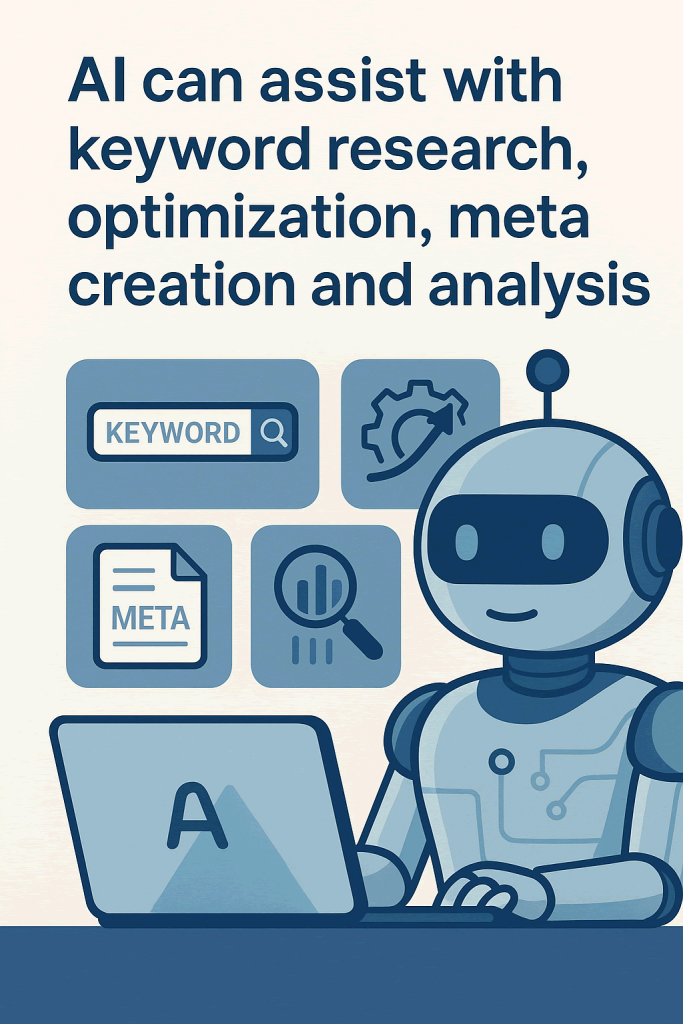
For small and medium-sized websites, AI is especially valuable because it eliminates the need for a large in-house SEO team. Tools like Surfer SEO, SEMrush AI, and even OpenAI integrations can suggest headlines, meta descriptions, internal linking structures, and real-time content improvements all based on data-driven insights. This means faster ranking improvements, better targeting, and more visibility in search engines with less effort.
AI SEO Stack for WordPress
| Task | Plugin / Tool |
|---|---|
| Keyword Discovery | ChatGPT + Semrush API / Ahrefs CSV |
| Writing | GPT AI Power, AI Engine |
| Optimization | RankMath AI, SurferSEO |
| Meta Automation | AI Engine shortcodes or custom PHP |
| Audits | Screaming Frog + GPT summarization |
AI also supports technical SEO, scanning for broken links, performance bottlenecks, indexing issues, and mobile responsiveness. It can flag critical problems, recommend fixes, and even automate routine updates like sitemap submissions or schema markup. With these tasks streamlined, your site stays optimized without constant manual oversight.
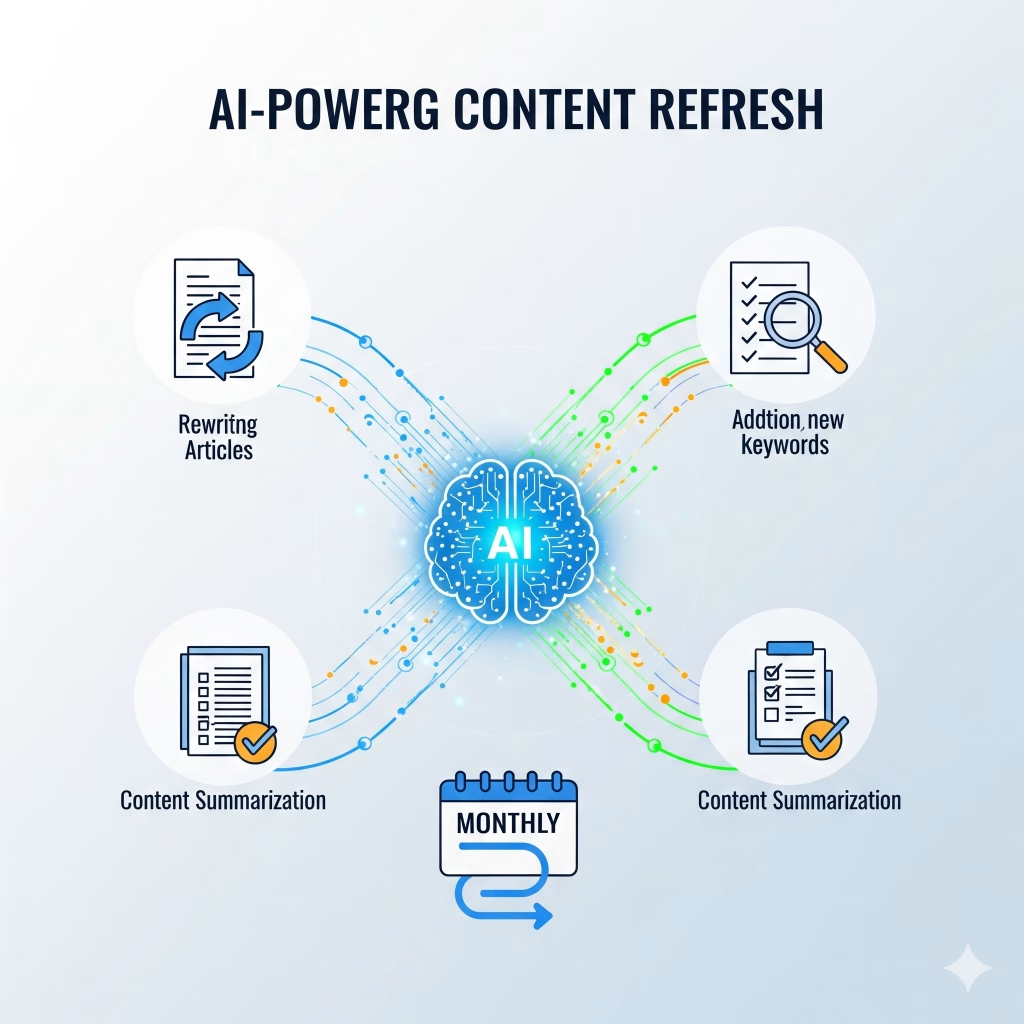
✅ How AI Can Be Used for SEO
🔍 1. Keyword Research
AI tools analyze search trends, suggest related terms, and cluster keywords by intent.
- Tools: Semrush Keyword Magic Tool, Ubersuggest AI, ChatGPT with SERP data
- Automation: Use GPT to generate long-tail keywords or group by buyer journey stages
✍️ 2. Content Creation & Optimization
AI generates SEO-optimized content based on focus keywords, tone, and competitor gaps.
- Write blog posts with the right keyword density and structure
- Rewrite or expand thin content
- Add suggested FAQs, headers, internal links
- Tools: GPT AI Power, SurferSEO + GPT, AI Engine, Frase.io, NeuronWriter
🧠 3. Meta Tags & Snippets
Generate:
- Title tags
- Meta descriptions
- Alt text for images
- Schema markup
These can be dynamically created or batch-generated using AI.
- Plugins: RankMath AI, Yoast + GPT via custom field hooks, AI Engine shortcodes
🕷 4. Technical SEO Insights
AI can audit your site’s structure, detect crawl issues, and suggest improvements.
- Use GPT or AI-powered crawlers to analyze:
- Broken links
- Missing schema
- PageSpeed suggestions
- Tools: Screaming Frog + GPT, Sitebulb AI, ChatGPT with exported reports
At Wemaxa.com, we integrate AI tools into every phase of our SEO workflow from the planning stage to post-launch performance tracking. Whether you’re launching a new site or trying to boost visibility for an existing one, AI gives you the competitive edge needed to stay ahead in today’s search-driven landscape. It’s no longer optional it’s essential.
MORE LINKS:
AI bots installation
AI automation
ChatGPT integration
Content generation
AI user support
Best CMS for AI
AI in small business
AI newsletters
Content moderation
USE AI FOR SEARCH ENGINE OPTIMIZATION
Can AI Be Used for SEO?
Artificial Intelligence has rapidly transformed from a futuristic concept into a central component of modern digital strategies, and nowhere is this more evident than in the field of Search Engine Optimization (SEO). Many business owners and marketing professionals ask whether AI can be used to improve their SEO efforts, and the short answer is yes. AI can significantly enhance keyword research, content optimization, backlink strategies, and on-page performance analysis. By leveraging advanced natural language processing models, AI tools can understand not only what people are searching for but also why they are searching for it, which gives businesses a critical advantage. For example, platforms like Ubersuggest or AI-driven solutions such as SEMrush are now equipped with algorithms that evaluate search intent, competitive landscapes, and long-tail keyword opportunities far faster than manual research could ever achieve. This allows businesses to align their websites with search engine expectations while also creating content that resonates deeply with their target audience.
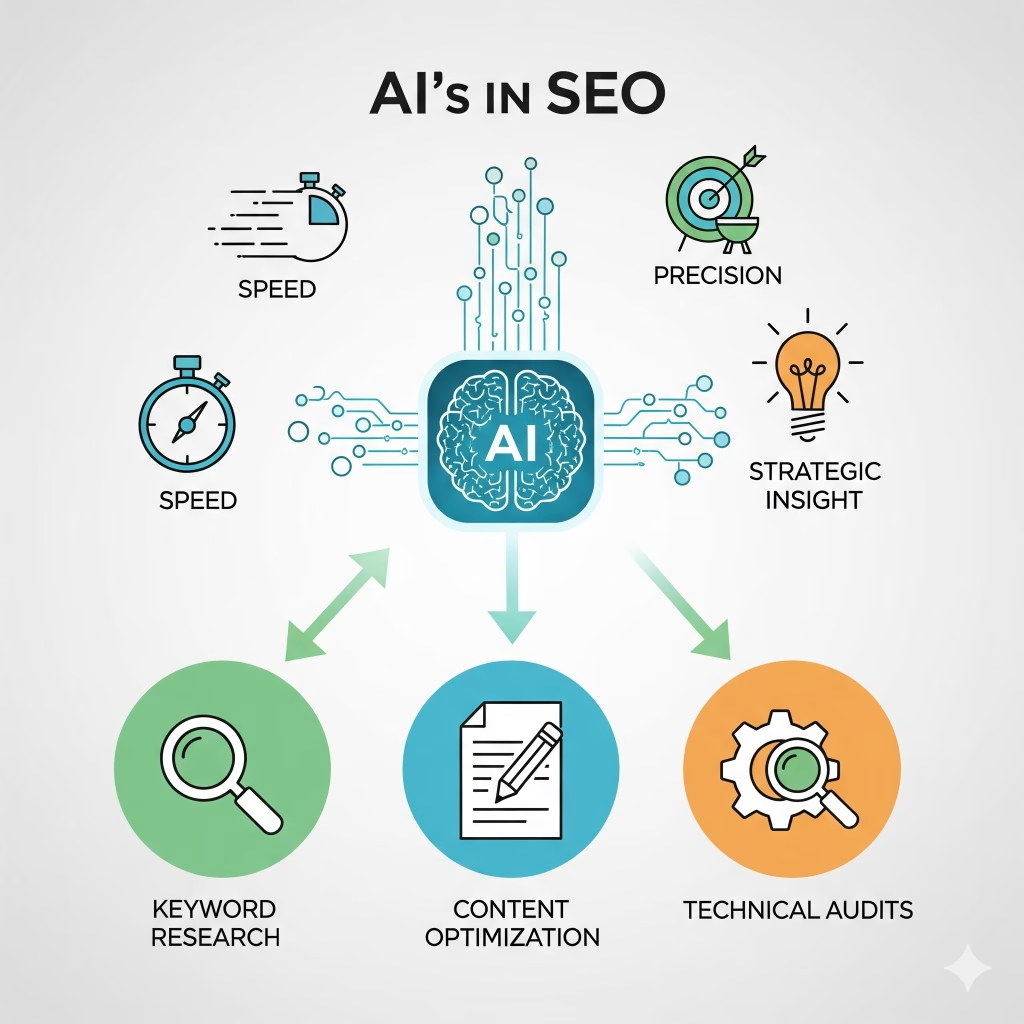
Another major area where AI is revolutionizing SEO is content generation and optimization. Tools like Jasper or Copy.ai can generate draft blog posts, meta descriptions, and even ad copy in minutes, which saves countless hours of manual writing. While this does not replace the need for human creativity and editorial judgment, it gives content teams a powerful foundation on which to build. AI algorithms can also analyze top-performing pages across the web, identify structural patterns, and recommend improvements to headline density, keyword placement, or internal linking strategies. With Google increasingly rewarding websites that provide high-quality, contextually relevant content, the ability of AI to rapidly identify what “quality” looks like in a given niche is invaluable. However, businesses must remain cautious, as over-reliance on auto-generated text without human oversight can backfire, potentially leading to penalties or a diluted brand voice. The most effective approach is a hybrid one, where AI accelerates research and drafting, and human expertise ensures accuracy, authenticity, and brand consistency.
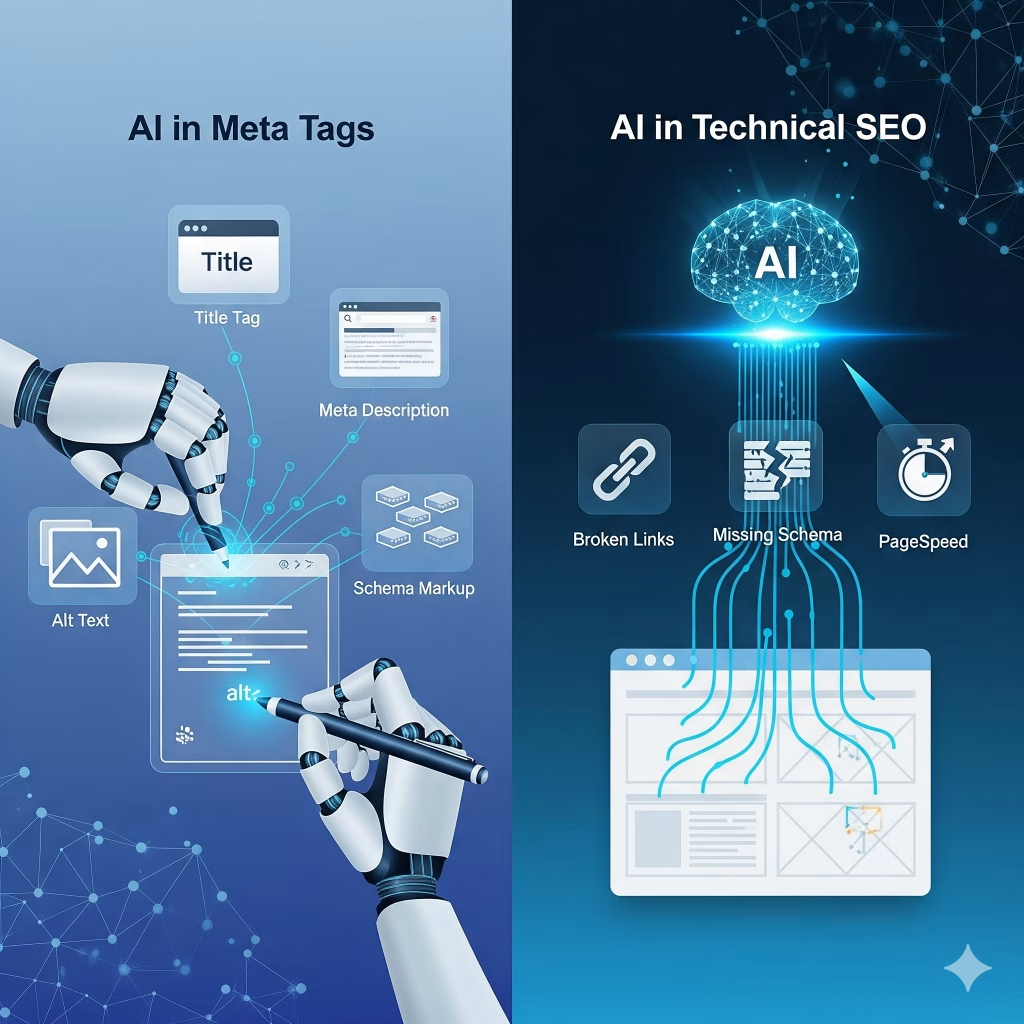
Beyond content, AI is also helping businesses with technical SEO, site performance, and user experience optimization. AI-based crawlers and audit tools can now detect slow-loading pages, poor mobile responsiveness, duplicate content, or broken links with far greater efficiency than manual checks. Services such as Ahrefs and Moz are integrating AI models to provide predictive analytics, showing not only what issues currently exist but also which issues are likely to affect rankings in the near future. This predictive layer is crucial, especially in a digital environment where search engine algorithms change hundreds of times per year. Additionally, AI can be integrated with customer behavior tracking tools like Hotjar or Microsoft Clarity to provide deep insights into how users interact with your site. These insights go beyond traditional SEO, helping businesses make data-driven decisions that improve user satisfaction, which in turn boosts ranking signals such as dwell time and bounce rate.
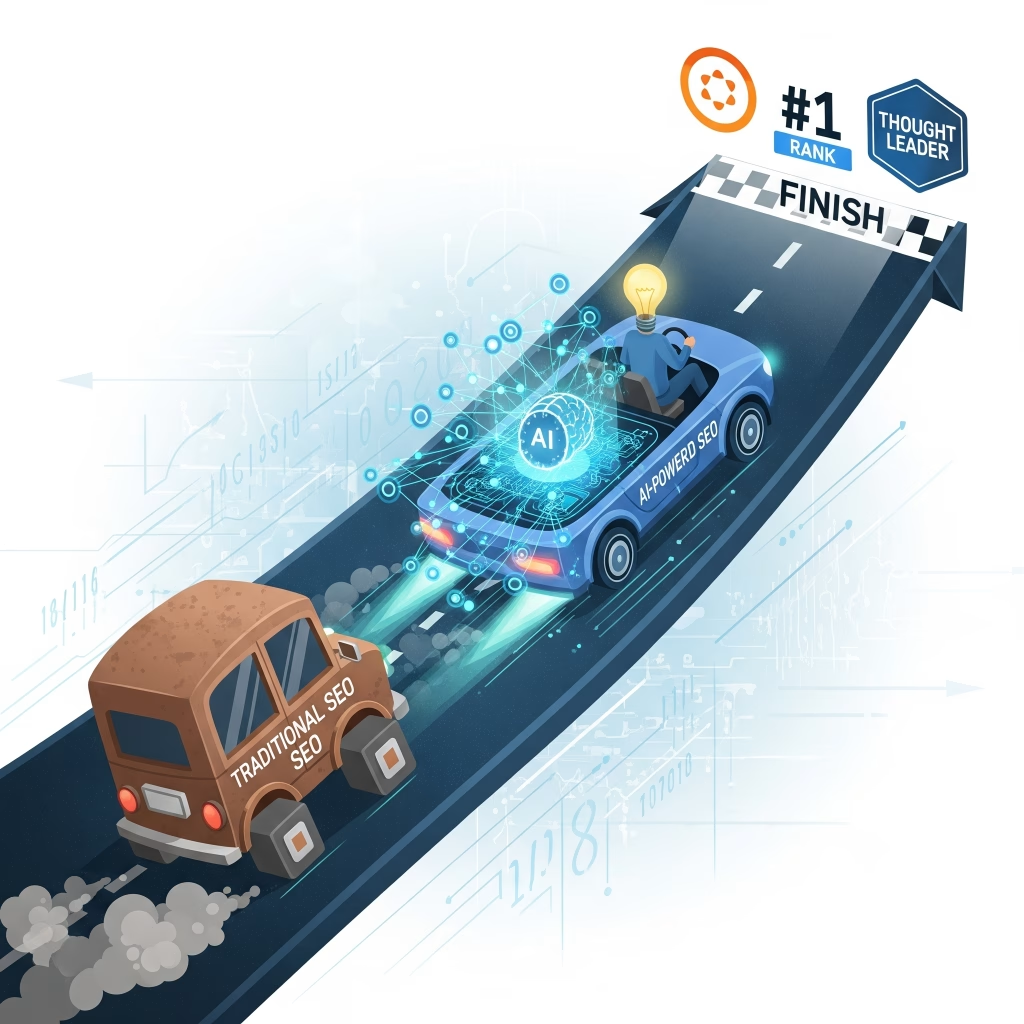
The growing reliance on AI in SEO also raises an important strategic consideration: staying ahead of competitors who are also adopting these tools. As more companies integrate AI into their digital marketing workflows, the baseline for what qualifies as “optimized” content or a “fast” website rises. In other words, what was considered advanced SEO two years ago has now become the minimum standard in 2025. Businesses that fail to adopt AI risk falling behind not only in rankings but also in visibility, conversions, and customer engagement. That said, success does not come from blindly using AI; it comes from integrating AI intelligently into a broader digital strategy. Combining AI insights with human creativity, robust branding, and a well-planned content calendar remains the most effective way to achieve long-term SEO success. Companies that adopt this balanced approach will not only improve their search engine rankings but also position themselves as thought leaders within their industries, gaining authority and trust in the eyes of both customers and search algorithms alike.
🔄 Ongoing Content Refresh
AI can:
- Rewrite underperforming articles
- Add new keywords
- Generate summaries or table of contents
- Check for readability, duplication, freshness
You can automate this monthly using cron + GPT or Zapier flows.


